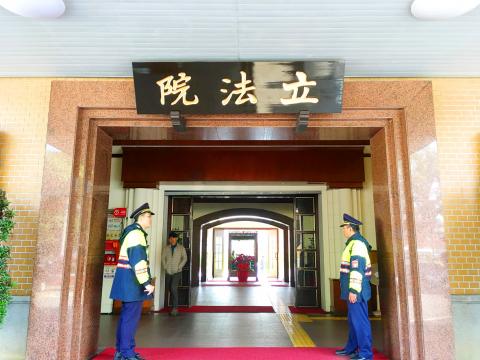A draft amendment to broaden the definition of treason to include collusion with China has been submitted for legislative negotiations, with the first round of cross-caucus talks expected to begin tomorrow at the soonest.
Under the Criminal Code, treason through collusion must involve an “enemy state” and is therefore inapplicable to Taiwanese who spy for China.
The draft amendment, proposed by Democratic Progressive Party Legislator Wang Ting-yu (王定宇), seeks to expand the definition of treason to include collusion with an “enemy” — described in the proposal as any “country, political entity or organization that engages in armed conflict or a military standoff with the Republic of China,” or “posing a military threat to the nation.”

Photo: Lin Liang-sheng, Taipei Times
If passed, individuals caught colluding with China with the intent to subject Taiwan’s territory to its rule could be sentenced to death or life imprisonment.
The Criminal Code’s provisions on treason through collusion have been useless in practice, resulting in a serious flaw in the nation’s security, Wang said.
Considering that the draft involves the safety of 23 million Taiwanese, hopefully legislators across party lines would agree to pass it quickly without touching on the issue of the nation’s status, he said.
Only when the problem with the Criminal Code is solved can the government begin to deal with other issues in national security laws, he said.
Wang had previously cited as an example the case of retired vice admiral Ko Cheng-sheng (柯政盛), whose final assignment was deputy commander of the navy fleet.
Ko was sentenced by the Supreme Court in March 2015 to 14 months in prison for helping China set up a spy ring involving officers under his command and passing on classified military information to China, because the Criminal Code does not address Chinese espionage cases.
The amendment would close this loophole, Wang said.
Since the amendment was proposed in 2017, opposition parties have blocked it many times, he said.
“Now it has finally reached the final step,” he said.
Even if cross-caucus negotiations broke down, the amendment would still be put to a vote on the legislative floor, he said.

INVESTIGATION: The case is the latest instance of a DPP figure being implicated in an espionage network accused of allegedly leaking information to Chinese intelligence Democratic Progressive Party (DPP) member Ho Jen-chieh (何仁傑) was detained and held incommunicado yesterday on suspicion of spying for China during his tenure as assistant to then-minister of foreign affairs Joseph Wu (吳釗燮). The Taipei District Prosecutors’ Office said Ho was implicated during its investigation into alleged spying activities by former Presidential Office consultant Wu Shang-yu (吳尚雨). Prosecutors said there is reason to believe Ho breached the National Security Act (國家安全法) by leaking classified Ministry of Foreign Affairs information to Chinese intelligence. Following interrogation, prosecutors petitioned the Taipei District Court to detain Ho, citing concerns over potential collusion or tampering of evidence. The

‘FORM OF PROTEST’: The German Institute Taipei said it was ‘shocked’ to see Nazi symbolism used in connection with political aims as it condemned the incident Sung Chien-liang (宋建樑), who led efforts to recall Democratic Progressive Party (DPP) Legislator Lee Kun-cheng (李坤城), was released on bail of NT$80,000 yesterday amid an outcry over a Nazi armband he wore to questioning the night before. Sung arrived at the New Taipei City District Prosecutors’ Office for questioning in a recall petition forgery case on Tuesday night wearing a red armband bearing a swastika, carrying a copy of Adolf Hitler’s Mein Kampf and giving a Nazi salute. Sung left the building at 1:15am without the armband and apparently covering the book with a coat. This is a serious international scandal and Chinese

Seventy percent of middle and elementary schools now conduct English classes entirely in English, the Ministry of Education said, as it encourages schools nationwide to adopt this practice Minister of Education (MOE) Cheng Ying-yao (鄭英耀) is scheduled to present a report on the government’s bilingual education policy to the Legislative Yuan’s Education and Culture Committee today. The report would outline strategies aimed at expanding access to education, reducing regional disparities and improving talent cultivation. Implementation of bilingual education policies has varied across local governments, occasionally drawing public criticism. For example, some schools have required teachers of non-English subjects to pass English proficiency

TRADE: The premier pledged safeguards on ‘Made in Taiwan’ labeling, anti-dumping measures and stricter export controls to strengthen its position in trade talks Products labeled “made in Taiwan” must be genuinely made in Taiwan, Premier Cho Jung-tai (卓榮泰) said yesterday, vowing to enforce strict safeguards against “origin laundering” and initiate anti-dumping investigations to prevent China dumping its products in Taiwan. Cho made the remarks in a discussion session with representatives from industries in Kaohsiung. In response to the US government’s recent announcement of “reciprocal” tariffs on its trading partners, President William Lai (賴清德) and Cho last week began a series of consultations with industry leaders nationwide to gather feedback and address concerns. Taiwanese and US officials held a videoconference on Friday evening to discuss the